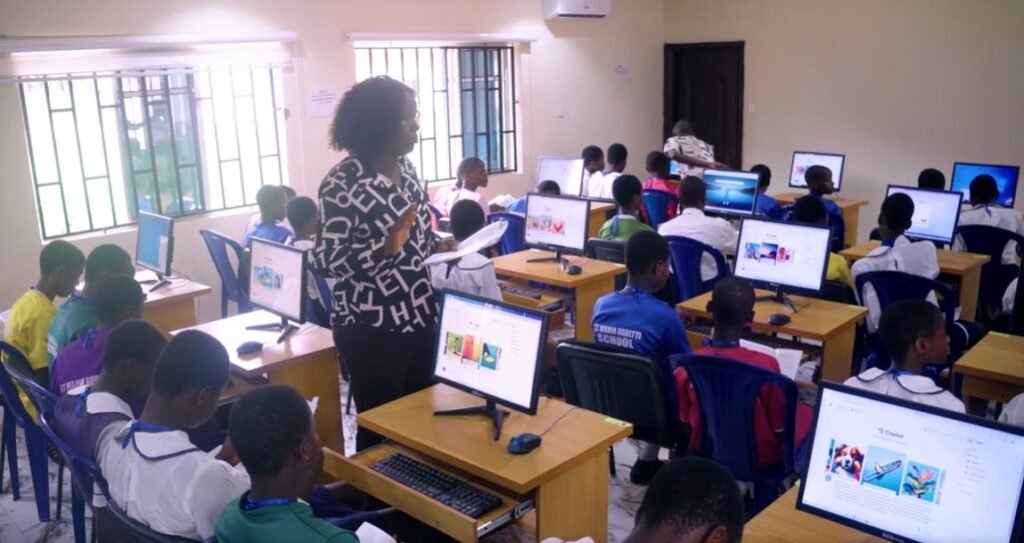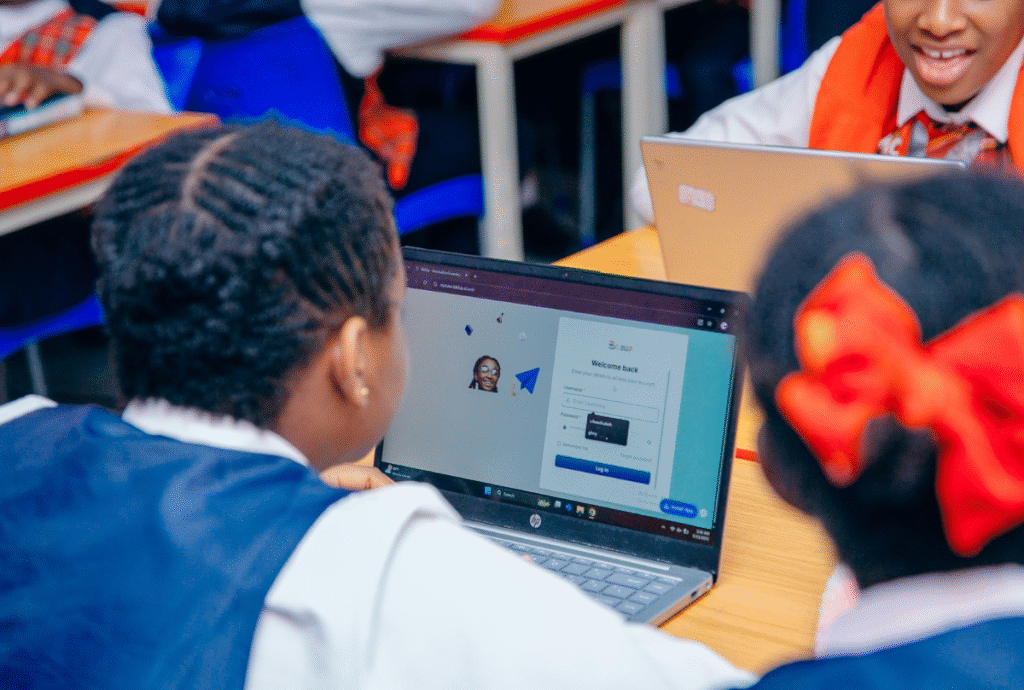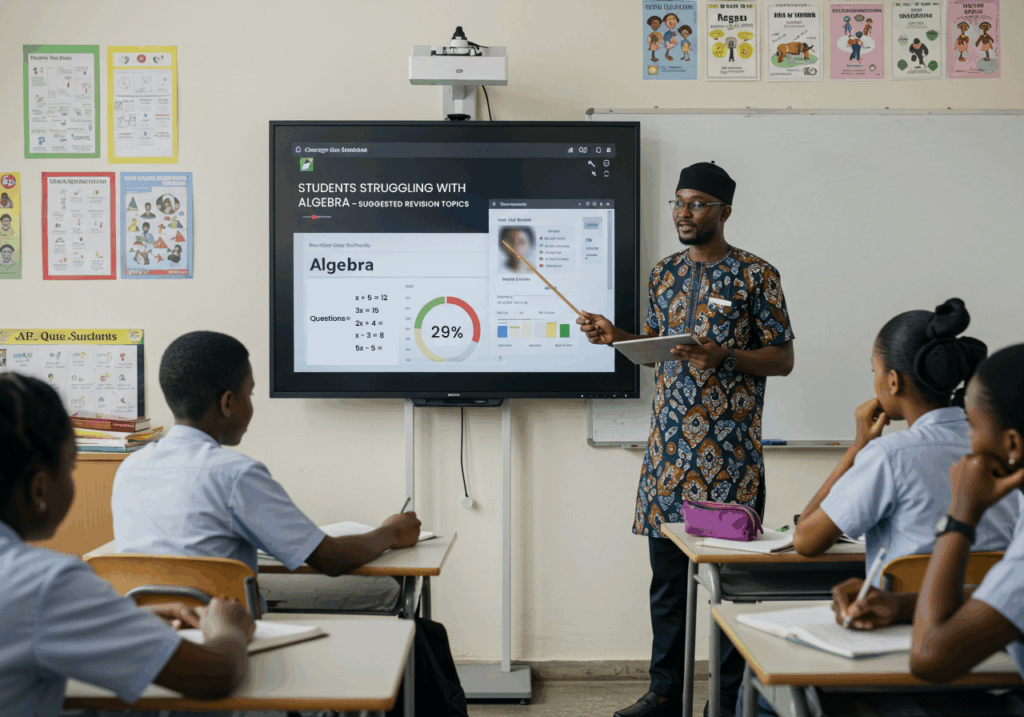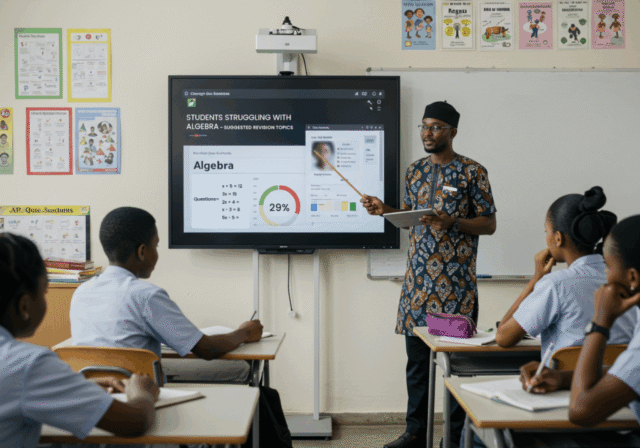In Nigeria today, the phrase “smarter classrooms, real results” takes on new urgency as Artificial Intelligence (AI) steps into the heart of our schools. The technology once confined to speculative futurism is rapidly becoming a tool in teachers’ hands and students’ backpacks, reshaping learning, prompting fresh hopes — and sober questions — about what education could become.
Table of Contents

A Quiet Revolution in the Classroom
Walk into many Nigerian secondary or tertiary institutions today, and you might spot AI quietly at work. From adaptive lessons on tablets to chatbots answering homework queries after dark, AI is no longer mere hype; it is increasingly woven into the fabric of everyday schooling.
These tools bring a host of advantages. Teachers report reclaiming precious hours previously spent correcting assignments, while students benefit from real-time guidance and tailored support. AI’s ability to adjust content on the fly — making it more challenging or slower, depending on how fast the learner grasps the material — means that no student gets left behind. That personalisation, once only a distant ideal, is becoming feasible.
Studies from other contexts reinforce optimism: meta-analyses of dozens of AI-assisted learning experiments have pointed to moderate, measurable gains in both retention and competency. In Nigeria, those gains offer real promise — especially in classrooms where student-to-teacher ratios are high, resources are limited, and the learning needs are widely varied.
At the University of Nigeria, for example, lecturers are experimenting with AI tools to help students build coding projects earlier in their academic timeline. Those with weak backgrounds in programming are able to interact step by step, receiving hints or scaffolded guidance, without the lecturer needing to intervene for every detail. Such augmentation frees instructors to focus on deeper conceptual challenges.
Real-Time Support: Bridging Gaps When It Matters
One of the most exciting features of AI in education is its always-on support. Students needing help at midnight or during weekend study sessions no longer must wait until school resumes. With chatbots or intelligent tutoring systems, they can ask questions, receive hints, or get feedback as they work — precisely when they most need it.
In Nigeria, where access to teachers outside school hours is often limited, this can make a vital difference. An undergraduate preparing for exams can explore difficult topics through AI guidance. A secondary school pupil struggling to understand a math concept doesn’t have to wait for the next class or peer help. That continuous feedback loop keeps learners engaged and prevents frustration from snowballing into dropout or disengagement.
Teachers also benefit. Some report saving five to six hours each week — hours once dedicated to marking, scaffolding revisions, or crafting alternate explanations. That time is now redirected toward designing richer lessons, planning group projects, or giving students more one-on-one support.
Moreover, AI tools can help level the playing field. Features like voice-to-text, translation, or alternate presentation formats support students with disabilities or learners not fluent in English. In Nigeria’s ethnically and linguistically diverse classrooms, adaptive translation and localisation help make lessons more inclusive.

Challenges and Ethical Fault Lines
For all its advantages, AI in the classroom also brings thorny challenges — many of them acute in a Nigerian context.
Plagiarism, academic integrity, and misuse
One of the biggest worries among educators is that AI may encourage shortcut behaviours. Students might deploy generative tools simply to produce essays or assignments, bypassing original thought. If not guided carefully, learners could become reliant on AI’s output without engaging deeply with ideas.
In response, many teachers are already drawing firm lines: prompts that ask for full essays, for instance, may be prohibited. Instead, assignments must reflect students’ own reasoning, with AI serving only as a scaffold or guide — not the author.
Data privacy and surveillance
AI systems rely on large quantities of data. In Nigeria, where regulatory frameworks around educational data and privacy are still evolving, the question of who owns or controls that data is critical. Trust is fragile. If platforms collect or store student or teacher data without transparency, both safety and buy-in suffer.
Courses designed by professors at American universities often include warnings about using third-party AI platforms without strong privacy guarantees. In Nigeria, institutions may consider building or endorsing “in-house” platforms to retain control and ensure compliance with local data rules.
Digital divide and infrastructure gaps
None of these benefits matters if students can’t access the technology. In many parts of Nigeria — particularly rural or underfunded regions — unstable electricity, lack of reliable internet, or absence of devices remain barriers. Pushing AI-enabled learning without addressing those foundational gaps risks widening inequalities, not closing them.
Moreover, educators themselves must be upskilled. Many teachers have limited experience with AI tools, requiring targeted training, support networks, and institutional buy-in.
The Path Ahead: From Promise to Practice
If Nigeria is to reap smarter classrooms, real results, the following approaches may help translate potential into impact.
Strategic rollout and pilot programmes
Rather than blanket implementation, the wisest path is phased piloting. Select schools in different regions — urban, peri-urban, rural — and trial AI tools while carefully monitoring outcomes. Those pilots can help iterate systems, reveal unexpected challenges, and build local evidence of impact.
Co-design with teachers and students
AI interventions are likelier to succeed if users help shape them. Teachers and students should participate from the start in identifying pain points, designing workflows, and crafting safeguards. Their insights ensure that the tools address real needs — not just idealised tech fantasies.
Localisation and contextual relevance
One-size-fits-all AI, especially models developed far from Nigerian realities, may miss critical context. Curricula, idioms, exam systems, cultural references, and language variants differ. Adapting models to local syllabi, languages (such as Hausa, Yoruba, Igbo) or pedagogical norms increases relevance and acceptance.
Regulatory and policy frameworks
Nigeria will need robust education AI policies — including data protection rules, guidelines for academic integrity, standards for vendor contracts, and oversight mechanisms. Ministries of Education, regulatory bodies, and educational institutions must collaborate to ensure safe, equitable deployment.
Continuous evaluation and iterative design
AI is not set-and-forget. Rigorous monitoring and evaluation — not just test scores but engagement, equity metrics, and unintended consequences — must guide ongoing refinement. Feedback cycles with teachers and students will help adjust systems to evolving realities.

Conclusion
In Nigeria, the idea that smarter classrooms deliver real results is no longer speculative. AI is already enabling new forms of personalised learning, freeing teacher time, and expanding access to help. But with great promise comes equal responsibility. The path ahead demands careful design, equity awareness, technical infrastructure, and ethical guardrails.
If Nigeria can navigate those complexities, its schools may not only close gaps but leapfrog into a new era of dynamic, responsive, student-centred learning. Smarter classrooms, real results — that vision is within reach, provided we build with intention, not haste.
Join Our Social Media Channels:
WhatsApp: NaijaEyes
Facebook: NaijaEyes
Twitter: NaijaEyes
Instagram: NaijaEyes
TikTok: NaijaEyes





